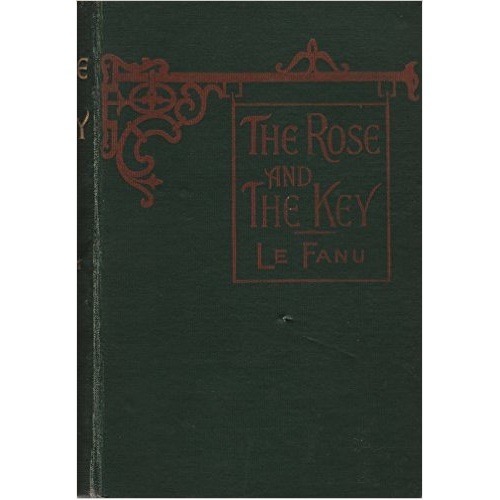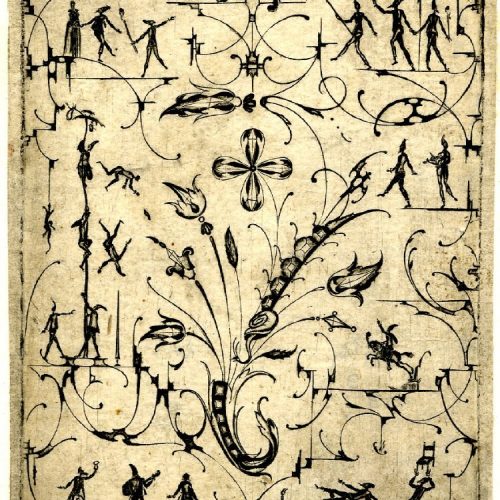There are some people, my dear, who hate advice, and, on the whole, do you know, I rather think they are right.
Elvis Depressedly – “A Bible in a Bath of Bleach”
Mickey’s Dead
A minimal yet tone-rich album that sounds like it was recorded in a bedroom, Mickey’s Dead finds a middle ground somewhere between Sparklehorse and Midlake circa Bamnan and Silvercork. And despite the sad-sack trappings of the band’s name, the album’s name, and the song’s name, this isn’t some weepy tale of woe. (NB: be prepared to turn down the volume for the wash of distortion at the end) (bandcamp)
The Rose and the Key (Joseph Sheridan Le Fanu , 1871)

The name Joseph Sheridan Le Fanu is one that, today, hardly produces even a twinkling of recognition in the most word-worn eye. The author was, however, quite popular at the time he was most actively writing – the 3rd quarter of the 19th century – and he was, in particular, well known for his gothic romances. The genre was summed up fairly adequately by a friend of Vonnegut’s: “a girl takes a job in an old house and gets the pants scared off her” – but within that general framework there is much room for variation, as The Rose and the Key shows.
Uncle Silas is the most lauded of his books along these lines (though Carmilla gets love too) , and perhaps rightly so: of his novels I’ve read, Wylder’s Hand is entertaining but let down by unsatisfying villainy, and The Rose and the Key is, while similar to Uncle Silas in some ways, very different in tone. It is, however, a very entertaining frog-in-the-pot experience, effectively hiding the machinations and malice that mark the antagonists of gothic romances from the eye of both the reader and the main character.
An 1881 “isochronic” map representing travel time to various regions. (more)
Great Sherlock Holmes charts by Adam Frost and Jim Kynvin for The Guardian
Bing & Ruth – “And Then It Rained”
City Lake
One of the most melancholy tracks I’ve heard in ages, “And Then It Rained” is part of a very surprising spread of music offered by this incredibly talented group. Their two ambient/classical/noise albums are equal parts Stars of the Lid, The Wind-Up Bird, and perhaps Hauschka, and entirely worth your time. (artist page)
Selected entries from Ambrose Bierce’s “Write It Right”
Ambrose Bierce was a good writer, but perhaps more important to him than the ultimate perceived quality of his writing was the pride he took in what he would call its precision. This quality he attempted to promote with a short usage volume entitled “Write It Right: A Little Blacklist of Literary Faults.”
Precision, he writes in the introduction, “is attained by choice of the word that accurately and adequately expresses what the writer has in mind, and by exclusion of that which either denotes or connotes something else. As Quintilian puts it, the writer should write so that his reader not only may, but must, understand.”
Thus, “capacity” should not be used when “ability” is meant, nor “continual” for “continuous,” and so on. The goal is not just successful communication, for which purpose even nonsense words will serve (and often do), but removing any possibility of misconstrual. It is worth noting that it is strictly for “serious discourse” such as news writing and letters that he advises, not poetry or other creative prose, in which creative or ambiguous usage is not discouraged (here, at least).
If it were not that every child of earth must learn wisdom for himself in the school of pain and labour, and if experience were orally communicable, as old people are prone to fancy, and if youth were less conceited and selfish, comparatively few foolish things would be done, and this life would lose, in a large measure, its efficacy as a place of discipline.
Thus, in the rough, the coarse old comedy is true; a great gulf separates age and youth. The youngsters will, to the end of time, prefer new lamps to old: they will trust their own senses, not yours. Buzz in the ears of your brood that flame burns and cobwebs catch. Their senses tell them that candlelight and warmth are pleasant, and liberty to fly high or low as one pleases; and, therefore, your love may as well be silent on those subjects. Otherwise you become, in their eyes, but a venerable muff and a bore. Nature has ordained that their nerves shall quiver, as yours have done, and their hearts thumb with fear; and when their turn comes they will scorch their wings, as you have, and make acquaintance with the spider.




